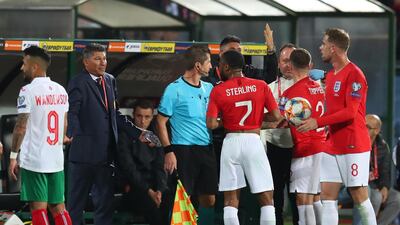The stakes were raised well before the first ball was kicked. The home team’s manager, indignant, had made remarks about the visiting nation’s issues with historic racism. "Look in the mirror if you want to see bigotry," he suggested, in response to questions about recent racist incidents in his own workplace.
What followed, come matchday, seemed nevitable, the uncertainty only over how often, how loud the abuse would be, and how flimsy the punishments. From start to finish the visiting team’s black players were routinely booed, serenaded with monkey chants. Blazered employees of the host Federation claimed they heard nothing. The abused individuals, stoically, continued to play, drawing some pride from maintaining their high professional standards through a toxic evening.
So it was on one of the England football team’s most dispiriting matches of this century. Yes, the hideous night in Madrid, against Spain, in the autumn of 2004. The one whose storyline eerily maps on to events fully 15 years later, in Sofia, Bulgaria on Monday.
For Luis Aragones, the combustible Spain head coach, who a month earlier had been recorded on camera using a racially offensive term, read Krasimir Balakov, the Bulgaria manager. Where Aragones set the tone ahead of Spain v England in 2004 with rambling references to British colonial shame, Balakov deflected from the fact his team had to host England in a part-closed section because of Uefa sanctions for racist incidents by saying: “I don’t think we have as big a problem as England do.”
For Ashley Cole and Shaun Wright-Phillips, singled out as punchbags for grunts and jeers at the Bernabeu 15 years ago, read Tyrone Mings, Raheem Sterling and Marcus Rashford, at the Vasil Levski arena. Mings reports hearing the first monkey chants while warming up before kick-off of this, his England debut. Like Cole and Wright-Phillips in Madrid, he cannot confidently report the abuse had ceased by the time the match was over.
In between Madrid 2004 and Sofia 2019, there have been several vile nights of abuse, often in Eastern Europe, and many more involving teams other than England.
They follow a pattern: First the monkey chants, then the three wise monkeys. There’s See No Evil, usually an official from the host FA, minimising all evidence of abuse from the grandstands. There’s Hear No Evil, the coach who turns deaf, like Balakov when he declared: “I personally did not hear the chanting." Then there’s Speak no Evil: He’s the player who wearily turns the other cheek, moves on, toughs it out.
Most of them were there in Bulgaria, though not quite as many as in Madrid. The distinctions are important, even if the scant progress made by the governors of the sport in tackling racism over 15 years remains plain.
Mings spoke out, felt empowered, early in the first half, to hear an insult and shoot out a glance at the fourth official in Sofia and ask: "Did you hear that?” He did so in the knowledge that a system exists to act immediately, Uefa’s three-step protocol, and that the referee would be obliged to honour it. Ashley Cole and Shaun Wright-Phillips never had that.
By half-time in Sofia, some of the mechanisms of Uefa’s protocol had been triggered: suspending play; the threat of abandoning the match broadcast via the public address system. A number of spectators, including some filmed having made Nazi gestures, left the stadium, apparently evicted. But the insults did not cease through the uninterrupted second half, the game was not abandoned and England’s players did not exercise the option of walking off.
For that they have heard a mixture of congratulation – for their stoicism, their professional focus, in a 6-0 win – and also some disappointment. A threshold might have been crossed, a precedent set, if they, a high-profile national team, had left the field.
That next step remains, very probably, a necessary one. There is barely more faith in the established tools for tackling racist abuse than there was 15 years ago, when Fifa fined the Spanish Federation less than $90,000 (Dh 330,000) after the Bernabeu outrage. In 2019, Uefa’s disciplinary committee will be armed with a basic tariff of a $55,000 fine and a one-match behind-closed-doors ban when they consider Bulgaria’s case.
The English FA urges more “stringent” penalties. They do so with less pious righteousness than a decade and a half ago. Led by their dignified manager Gareth Southgate, English football’s leadership make a repeated point of stressing that, within England, racism is also an ongoing problem.
Nor are England’s footballers uniquely targeted when they go abroad. In 2019, black footballers, be they from Belgium, Brazil or Benin, travel to certain venues all but expecting some sort of abuse. They wonder only how often, and how loud.


